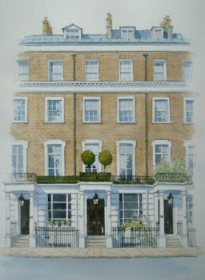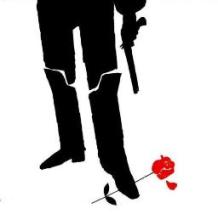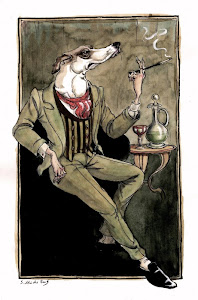 "As he passes the stretch of green at Cheyne Walk, presided over by a statue of Sir Thomas More, he sees a man in a tweed jacket practising his fly fishing on the grass, his lurcher sitting watching patiently. The gillies in Scotland taught Julian and Simon to cast on grass with a button in place of a fly. What is it about the English upper classes that it is still so important to associate themselves with the countryside? Lurchers, rabbits, tweed, Viyella shirts, caps--flat caps are back--and those Dijon mustard trousers. Signifiers. Signifying that these people are the true people of England. You never see a Jew in these togs, accompanied by a lurcher, although that Home Secretary chap used to dress up in new green wellingtons and corduroy trousers in his constituency. God, he looked like a twat. At Eton the thickos with inherited acres regarded themselves as far superior to the merely rich or intelligent."
"As he passes the stretch of green at Cheyne Walk, presided over by a statue of Sir Thomas More, he sees a man in a tweed jacket practising his fly fishing on the grass, his lurcher sitting watching patiently. The gillies in Scotland taught Julian and Simon to cast on grass with a button in place of a fly. What is it about the English upper classes that it is still so important to associate themselves with the countryside? Lurchers, rabbits, tweed, Viyella shirts, caps--flat caps are back--and those Dijon mustard trousers. Signifiers. Signifying that these people are the true people of England. You never see a Jew in these togs, accompanied by a lurcher, although that Home Secretary chap used to dress up in new green wellingtons and corduroy trousers in his constituency. God, he looked like a twat. At Eton the thickos with inherited acres regarded themselves as far superior to the merely rich or intelligent."Other People's Money, Justin Cartwright (2011)





















2 comments:
My next read on my summer reading list, thank you.
I never understood what separated the upper class from the merely well-to-do. Is it mannerisms, aristocratic blood lines, greater refinement in terms of musical or literary tastes, etc...
Those who had inherited acres looking down on the merely rich or intelligent... to an outsider looking in, the differences between any group of people at an elite boarding school seems fewer than the similarities between the groups of people.
There was also a time when the Vanderbilts, one of the most well-known and powerful families in America, were looked down upon by the established socialites and upper crust as being vulgar new money.
Now the Vanderbilts are the established, venerated upper class, and they must look down upon the vulgar Waltons, the new money Silicon Valley glorified pantry boys, Hollywood celebrities, as being the crass and socially climbing nouveau riche.
Post a Comment